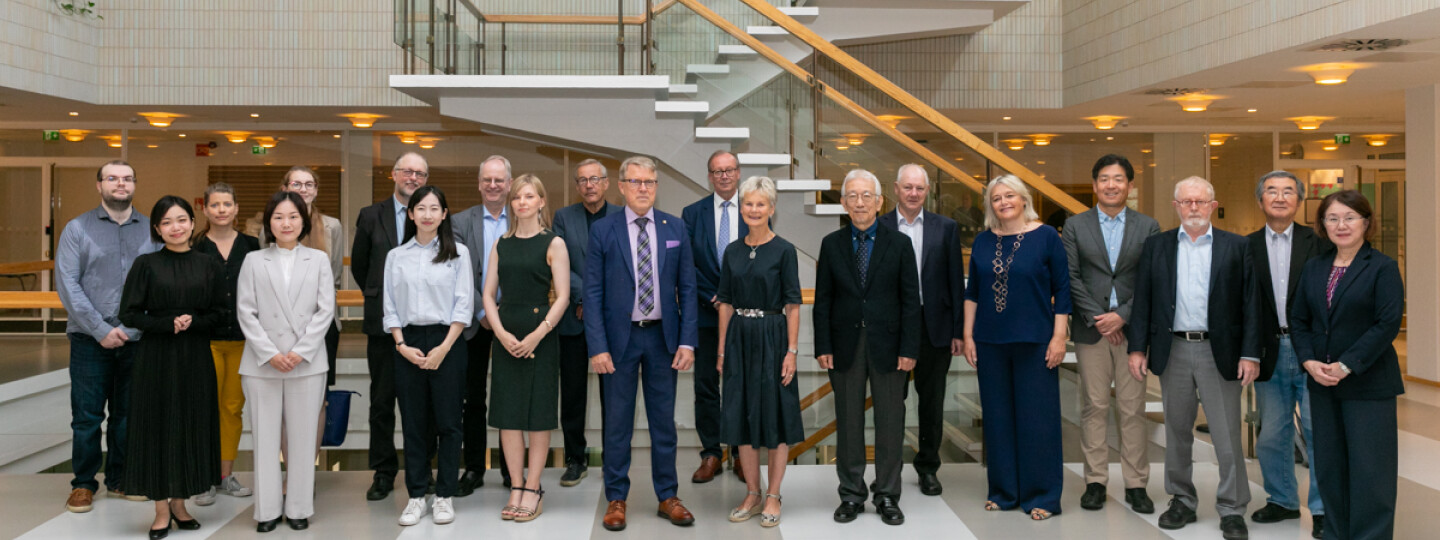The research conducted at the University of Turku and the Seili island were presented to the representatives of the Nippon Foundation and its sub-foundation the Scandinavia–Japan Sasakawa Foundation at the end of August.
The Nippon Foundation is the largest private foundation in Japan and a significant supporter of well-being in the global context. It works in close collaboration with the Sasakawa Foundation group. It covers 24 sub-foundations that support societies, science, culture and peace in different parts of the world.
The purpose of one of the sub-foundations, the Scandinavia–Japan Sasakawa Foundation, is to further promote the collaboration and relationships between the Nordic countries and Japan and to grant funding for research and education.
The visitors to the University of Turku from the foundations included Executive Director of the Nippon Foundation Ichiro Kabasawa, the Foundation's previous Executive Director and current Special Adviser Tatsuya-Tanami, the former United Nations Under-Secretary-General, Ambassador Kiyotaka Akasaka, the Chair of the Scandinavia–Japan Sasakawa Foundation, former Governor of Östergötland County in Sweden Elisabeth Nilsson, Professor Henrik Syse who is a member of the Norwegian Nobel Peace Prize Committee, and the Foundation’s Nordic board members.
Of the Finnish board members of the Scandinavia–Japan Sasakawa Foundation, the Vice Chair, Chancellor of the Orders of White Rose of Finland and Lion of Finland Dr Jussi Nuorteva, and Professor Sixten Korkman presented Finnish research and society to the Japanese guests during the visit. The guests were welcomed by Rector Jukka Kola of the University of Turku.
Interest in Japan reflected in theses
The Scandinavia–Japan Sasakawa Foundation has significantly supported the Centre for East Asian Studies at the University of Turku with a five-year funding for a university lecturer position. Kamila Szczepanska, who has been appointed to the position, and the Director of the Centre, Professor Lauri Paltemaa presented the activities of the Centre for East Asian Studies to the guests.
“Japan is the most popular country in the Centre’s EAST Master's Degree Programme on the basis of the theses. Japanese studies produce a steady and even an increasing number of master’s degree graduates. The theses cover versatile topics, such as the current significance of the Japanese Yokai culture, robotics in elderly care, and far-right activism in Japan,” describes Professor Paltemaa.
The representatives of the Foundation were interested in projects concerning East Asia and particularly Japan as well as in Szczepanska’s projects and research.
“The visit and the presentations were very rewarding as a whole. Kamila Szczepanska has succeeded excellently in combining research, education and networking in her work,” commends Jussi Nuorteva.

In the picture, the Vice Chair of the Scandinavia–Japan Sasakawa Foundation board Jussi Nuorteva, Nippon Foundation’s Scandinavian liaison Yuko Tani, Scandinavia-Japan Sasakawa-Foundation’s Head of Tokyo office Miki Futagawa, and the second Scandinavian liaison of the Nippon Foundation Rihoko Kikuchi.
Seili’s history and nature research interested the guests
The visit to Seili provided information on two topics that interested the representatives of the Foundations: environmental conservation and leprosy. Eradicating leprosy has become one of the main objectives of the Nippon Foundation. The Foundation also supports versatile environmental research and especially marine research through its sub-foundations.
Jussi Nuorteva describes the visit to Seili’s church as impressive. The island functioned as a leper colony in the 17th and 18th centuries when there was no other way to contain the disease than isolating the patients. In the Seili church, a rail separated the patients into their own section from the rest of the congregation.
“With its support forms, the Nippon Foundation has had a significant impact on reducing the occurrence of leprosy and the stigma related to the disease, and has nearly removed it from the list of diseases. However, further efforts are still needed especially in the developing countries,” says Nuorteva.
In the seminar held on the Seili island, the participants discussed biodiversity and environmental research from versatile perspectives.

Head of the University's Biodiversity Unit, Professor Ilari E. Sääksjärvi described the University’s activities and research on biodiversity and sustainability.
Among other things, the Biodiversity Unit led by Sääksjärvi conducts research and offers education on biodiversity and biodiversity loss and engages in versatile societal interaction. The Unit includes the research stations on the Seili island and at Kevo, Utsjoki in Lapland, where researchers conduct valuable longitudinal studies on the environment. Seili Station Manager Jari Hänninen and the John Nurminen Foundation gave presentations on the state of the Baltic Sea and the ongoing marine studies.
The participants to the Seili visit also included the Chair of the Board of the University of Turku Ritva Viljanen, former Rector of the University of Turku Kalervo Väänänen, who has also led an inquiry into improving the state of the Baltic Sea, and Medical Counsellor Sakari Alhopuro, who has significantly supported biodiversity research at the University of Turku.
Scandinavia–Japan Sasakawa Foundation invites applications for funding
During the visit, the participants discussed different ways of increasing collaboration between the researchers of the University of Turku and Japan. Jussi Nuorteva highlights the funding granted by the Foundation and he warmly encourages the members of the University community to apply for funding for research and education.
In addition to Japanese studies, the Foundation funds educational projects and studies in the fields of medicine, humanities, social sciences, technology and arts on the basis of the applications. The Foundation supports approximately 50 projects each year, and the call ends at the end of January.
More information on applying for the funding is available on the Foundation's website.
The representatives of the Foundations also visited Åbo Akademi University, the universities’ joint PET Centre, and met with the representatives of other organisations in the region, such as the City of Turku. Mayor of Turku Minna Arve also held a reception for the visitors.
Teksti: Tuomas Koivula
Kuvat: Suvi Harvisalo, Hanna Oksanen
